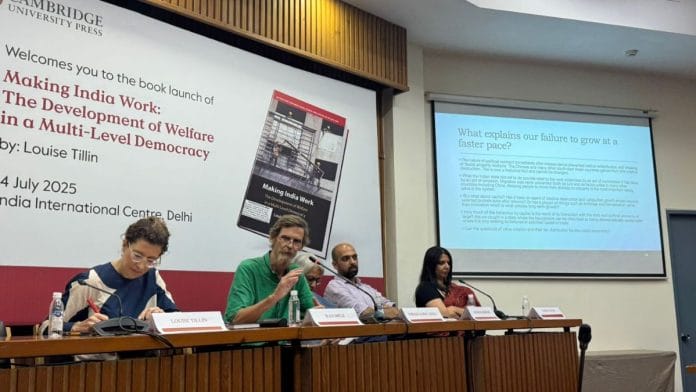New Delhi: The 1918 influenza epidemic hit Mumbai first, crippling its cotton textile industry and sparking industrial unrest. And this is what led to the birth of social insurance—for workers to cope during periods of sickness.
That’s how Louise Tillin, professor at King’s India Institute, describes the genesis of the Indian welfare state in her new book: Making India Work: The Development of Welfare in a Multi-level Democracy.
At the India International Centre, the conference hall was packed— from students to historians—all gathered to hear Tillin speak. The panel featured prominent voices: economist Jean Drèze, former CEO at Centre for Policy Research, Yamini Aiyar, Data and Data and Political Economy Editor at Hindustan Times, Roshan Kishore, and political scientist Niraja Gopal Jayal.
With pen and paper in hand, the audience listened as Tillin — academic to the core — opened her PowerPoint presentation. Her first slide read: Welfare schemes are ubiquitous.
“It goes without saying that welfare is ubiquitous as a form of public policy and a feature of India’s political landscape today,” said Tillin. “That ubiquity — or what appears to be ubiquity — is an essential corrective to a model of economic growth that has not, on its own, generated sufficient employment or addressed poverty and inequality.”
Behind her, the screen displayed a montage of welfare schemes: Ladli Behna Yojana, free ration distribution, and more.
Among the many scholars in attendance were political scientist Zoya Hasan, academician Balveer Arora, and Mekhala Krishnamurthy, associate professor of Sociology and Anthropology at Ashoka University.
Indian Beveridge Report
It was the summer of 1945 when BR Ambedkar invited British economist Sir William Beveridge to India. Ambedkar wanted to commission a dedicated Beveridge Report for the country — one that would integrate sickness insurance with broader elements of a social security system.
The story of Beveridge stood out to the panelists, historians, and political scientists in the room. None of them had come across this strand of history.
Panelist Yamini Aiyar recalled how surprised she was while reading the book.
“I didn’t know there was a moment when the possibility of an Indian Beveridge Report was actually imagined on the eve of Independence. That may well have been a game-changer,” she said.
But finally, Beveridge didn’t come because his idea of a welfare state did not align with Ambedkar’s.
“Beveridge didn’t come because he wanted to imagine a universal welfare state for India, and Ambedkar’s focus was more narrowly on what welfare would look like for industrial workers.
Even economist Jean Drèze didn’t know about the Ambedkar-Beveridge episode. He joked about asking ChatGPT to see if any such records existed.
“And even that didn’t know,” he said dryly — as everyone laughed in the audience.
Making India Work offers a historical account of India’s welfare regime, tracing how its foundations were laid — and where critical gaps were left. As Tillin writes, there is scant literature on the policy architecture India constructed to guard against social and economic contingencies.
“This book offers a historical account of what I describe as the foundational architecture of India’s welfare regime — and how both its content and its absences have shaped welfare’s evolution over time,” she said.
Also read: Digital wallets are making sure that Indian students get their scholarship on time
Notes to the author
Jean Drèze urged the audience to buy the book but didn’t hold back his critique – delivered in his usual witty fashion.
“I loved the book and I learnt a lot from it,” he said.
And Drèze simply dived into what he felt was downplayed in the book: the conflicting aspects of social policy and the role of social movements.
“I speak partly out of my experience. In the last 25 years, we had to fight at every step, especially against the resistance of the corporate sector and the employers. I think that is something that you don’t play quite a bit in your book,” said the senior economist, as Tillin noted his comment in her notebook.
He named several such policies — the Employment Guarantee Act, the Right to Information Act, and the Forest Rights Act — as he spoke about the role of social movements in shaping them.
Another critique was about the second part of the book being “too short.” “Please consider a second edition for the last part — about the informal sector — because it is where a lot of action takes place. I think the book is about social security. You don’t use the term so much. But I really think it is about social security,” Drèze said.
And as he concluded, his sarcasm found its way into the conversation.
“I’m a great advocate of the KISS principle — Keep it short, sweetie.” The audience burst into laughter.
(Edited by Ratan Priya)






